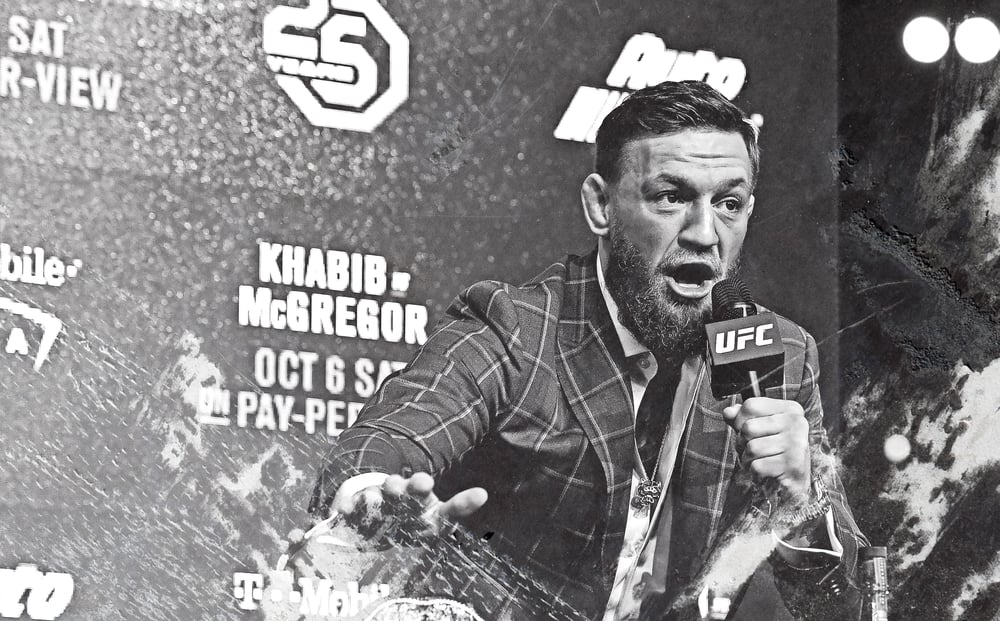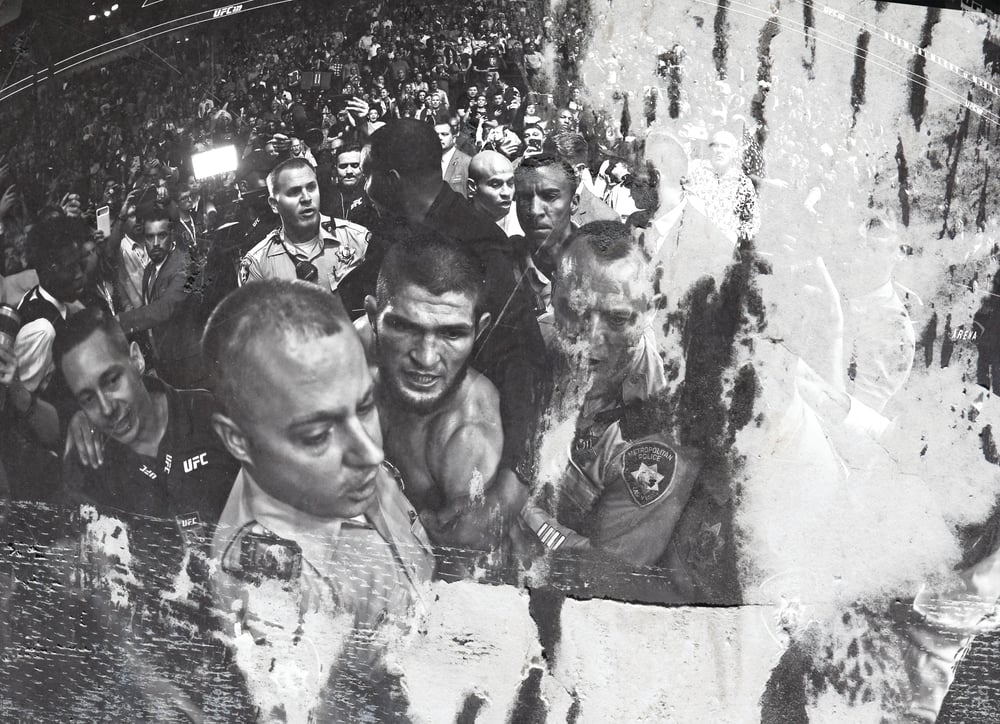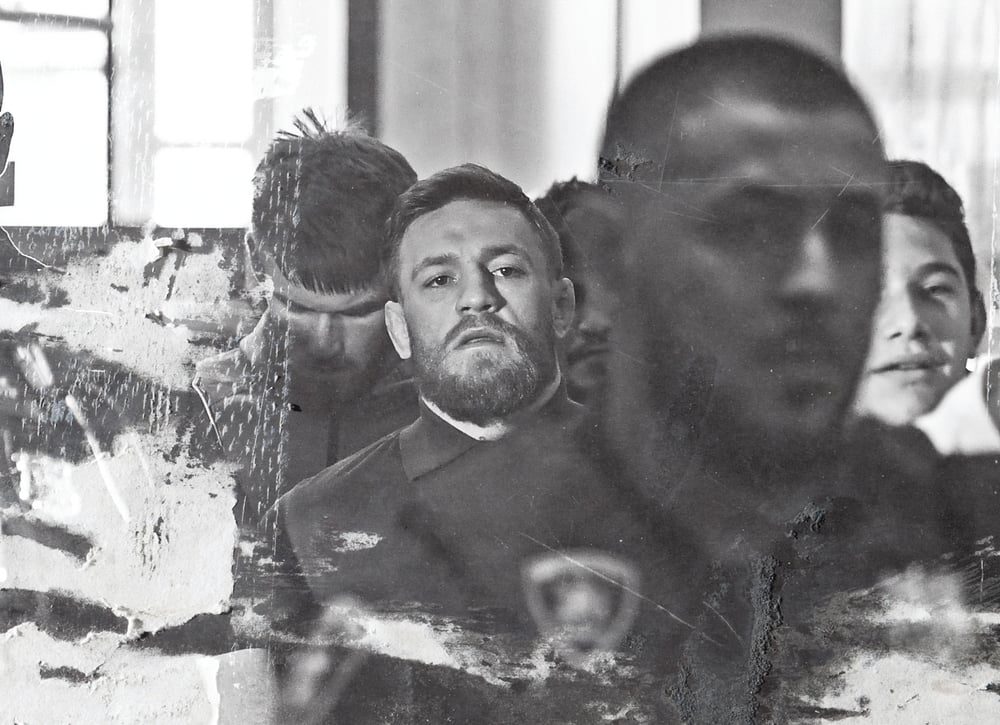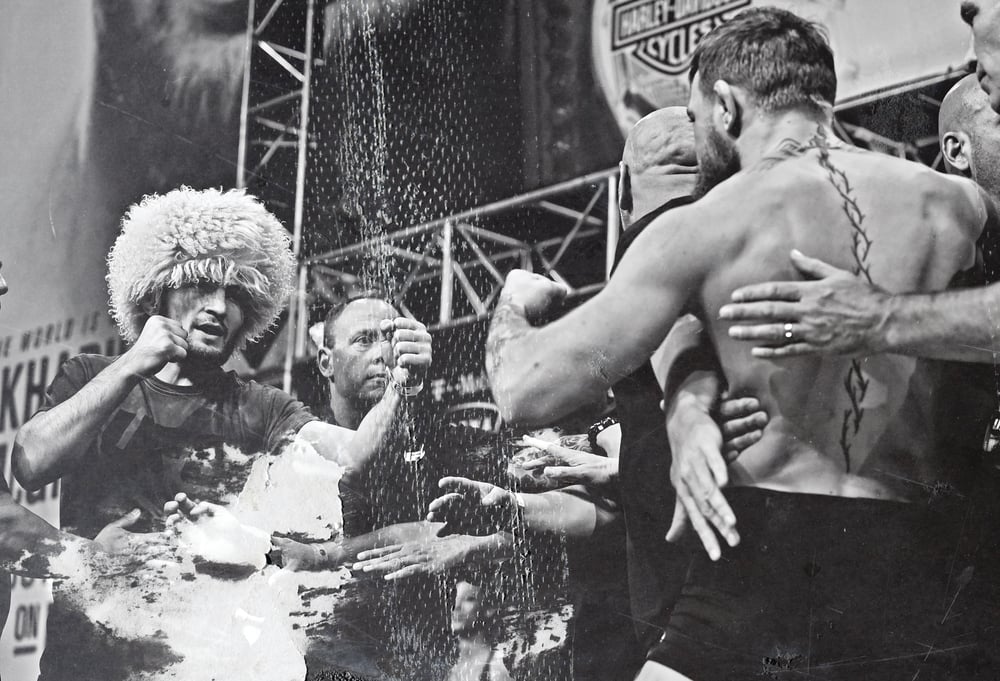
Issue 174
December 2018
"Talk now" is what Khabib said to Conor as he rained blows on him in the course of his victory at UFC 229. But was there too much talk in the build up to the event and does the UFC now need to control trash talk ahead of future contests? Or is it all just part of the fight game?
Trash talk is as integral to the fight game as the punches and kicks thrown in the heat of battle. Yet while those strikes are often launched with a degree of caution through fear of being countered, the same can’t be said of the words thrown with reckless abandon before, during and after a bout. Whether it’s used solely as mental warfare or the type of hype today’s generation of fight fan is increasingly accustomed to and perhaps expects, trash talk has never been so prevalent in combat sports as it is today.
However, it’s been around a while. Deeply-revered world heavyweight boxing champion Jack Johnson – the first African-American to claim the belt – won his title against Canada’s Tommy Burns after 14 rounds of dominance, talking to his opponent throughout. Johnson openly mocked Burns’ abilities in front of a baying mob of a crowd, calling his opponent, “Poor little Tommy,” laughing o any punches he got caught with in the process. This was in 1908.
Johnson encountered plenty of prejudice as a black boxer in early 20th Century America as his white counterparts either refused to, or were forbidden from fighting him – especially for a world championship – but he talked his way into a world title fight with Burns after a relentless two-year campaign of goading his Canadian foe in the press and in person, following Burns around the world to taunt him face- to-face. With his history-making victory and the spoils that came with it, Johnson’s strategy of trash talking quite literally paid dividends.

Fast forward 110 years. MMA is now a recognized sport, sharing space with boxing on the fighting landscape. The UFC is merely weeks away from celebrating its 25th anniversary and the sport’s long-standing, leading promotion is booming ahead of its silver anniversary festivities with UFC 229, an event which reportedly garnered 2.4 million pay-per-view buys, not far off doubling the UFC’s previous record.
UFC 229 was an event of its size thanks to the fighters featured in the card’s main event, Khabib Nurmagomedov of Dagestan, Russia, and Conor McGregor of Dublin, Ireland. The fight had an international feel; both fighters have each amassed a rabid following from their respective countries and beyond. For context, Nurmagomedov has almost 13 million Instagram followers at the time of writing, whereas McGregor has over 29 million.
It was also a title fight. McGregor was vying to reclaim the UFC lightweight belt he once called his own, while the unbeaten Nurmagomedov was looking to make the first defence of his newly- acquired status as the 155-pound division kingpin. Meanwhile, their reputations as masters of their craft – Nurmagomedov being the dominant wrestler boasting a spotless 26-0 record, McGregor the knockout artist – added an additional sense of intrigue which harked back to the old style vs. style MMA match-ups of yesteryear.
Any fight with McGregor’s name attached to it seems to capture the world’s imagination, but it was the pre-fight antics which really shot UFC 229 up to the stratosphere in terms of attention.
The touchpaper was lit back in April, when McGregor and a squad of around 20 others stormed Brooklyn’s Barclays Center to confront Nurmagomedov in response to the latter having a minor altercation with McGregor’s friend and long-time training partner, Artem Lobov ahead of UFC 223. By the time McGregor and his accomplices arrived, Nurmagomedov was sat in the bus carrying fellow red corner fighters due to fight in a couple of days’ time. Two fighters, Michael Chiesa and Ray Borg, were injured, and subsequently pulled from of their fights, as McGregor launched a metal dolly at the bus window in an attempt to get at Nurmagomedov.
UFC President Dana White was initially incandescent, branding the incident, “the most disgusting thing that has ever happened in the history of the company.” However, McGregor came away from this event relatively unscathed, receiving a slight slap on the wrist from his promotion and five days of community service from the New York courts after the Irishman pleaded no contest to a count of disorderly conduct. However, he now faces a legal battle as the aforementioned Chiesa filed a lawsuit against McGregor after getting caught up in the crossfire.

Fight fans the world over already wanted to see a fight between the two as McGregor looked set to return to the UFC’s Octagon following his brief stint in boxing. Now, anticipation for such a contest had reached its zenith.
To promote their fight, not that it needed any more hype, Nurmagomedov and McGregor appeared in two press conferences ahead of UFC 229. Such setpieces are seemingly obligatory when McGregor is involved, being arguably one of the nest smart mouths in combat sports history.
McGregor’s approach to talking about his upcoming opponents is largely focused on mental warfare with a bit of Irish banter thrown in, rather than to purely hype up a fight – any anticipation for a fight as a result of the Dubliner’s words is merely a by-product. It has worked wonders for him. You can make the case that Eddie Alvarez, Jose Aldo, Dustin Poirier, Dennis Siver and Max Holloway all looked markedly different when facing McGregor compared to how they appeared against other opponents in their long careers. Overly-invested, emotional, angry, bewildered; hose five fighters all experienced McGregor’s ferocity in and out of the cage and looked a shadow of their former and future selves, and all ultimately came a cropper.
Displaying the stoic intensity now expected of fighters hailing from Russia’s North Caucasus region, Dagestan’s Nurmagomedov barely raised an eyebrow for the majority of the first pre-fight press conference as McGregor threw some deeply personal barbs his way. But as “The Notorious” took things up a notch, talking ill of Nurmagomedov’s father, mentioning his alleged connections to some unsavory characters in Dagestan and Chechnya, Vladimir Putin and more, Khabib began to look increasingly agitated.
We have seen McGregor red up before his fights on plenty of occasions. But this really seemed like there was a personal grudge between both men. The press conference’s negative, nervous ambience could conceivably be due to the lack of crowd energy to feed from, but something was different. Talking of that New York press conference ahead of UFC 229, White said: “It was dark, man. It was the darkest press conference I’ve ever been part of.”
Amateur psychologists, AKA a lot of those posting comments on Twitter and YouTube, were convinced McGregor had Nurmagomedov’s number in the mental stakes. “The Eagle” seemed to show all the signs of a fighter who had had enough of McGregor’s trash talk, resorting to making a number of uncharacteristic comments about the Irishman’s family in the open workouts, as well as leaving their second pre-fight press conference early in protest at McGregor’s tardiness.
Nurmagomedov clearly used McGregor’s words and actions as fuel at UFC 229 as the Russian earned a fourth-round submission win from a fairly one-sided contest. “Talk now,” Khabib was overheard saying again and again as he rained down punches on his downed opponent before going on to finish the fight with a neck crank a couple of rounds later.
But instead of celebrating Nurmagomedov’s performance and his status as an unbeaten, 27-0 UFC lightweight champion, talk was turned to what unfolded immediately after the fight.

Firstly, an argument can be made that Khabib held onto his winning submission a little longer than necessary. Nurmagomedov then scaled the Octagon to attack McGregor’s cornermen, in particular, Dillon Danis, who is said to have provoked the champion during the bout. Chaos unsurprisingly ensued outside the cage, but it also erupted within.
A dazed McGregor realized what was going on outside the cage with Khabib and his team and looked set to head out of the cage himself. That’s until he saw Abubakar Nurmagomedov, Khabib’s cousin and a professional fighter himself, also get in the cage to involve himself in the disorderly scenes. Judging by the phone footage shared online from the fans in attendance at UFC 229, McGregor took a swing at Abubakar, who promptly fought back and appeared to go back for seconds, papakha hat in hand. Then, McGregor was attacked by two more Khabib cornermen, Zubaira Tukhugov, a UFC fighter himself, and Esed Emiragaev, inside the cage – the latter appeared to attack McGregor from behind.
Thankfully, the situation was defused fairly quickly by security, White, and other members of each fighter’s entourage, but a lot happened in a very short amount of time. White opted not to not wrap the UFC lightweight belt round the waist of Nurmagomedov to avoid causing a full-scale riot inside Las Vegas’ T-Mobile Arena. In a peculiar scene, UFC compere Bruce Buffer announced Nurmagomedov as the victor in an empty cage.
The UFC broadcast captured much of what happened and it’s very important to remember that this all unfolded before that reported record pay-per-view audience of 2.4 million, and that’s not including the viewers from outside North America and Australia. At the time of writing, no real action has been taken by the Nevada State Athletic Commission, though three members of Nurmagomedov’s team were arrested immediately after and quickly discharged once McGregor refused to press charges.
“A lot of bad stuff that shouldn’t have happened,” White said of the brawl. “Khabib jumped over the cage going after one of Conor’s guys, who I guess was talking trash to him, and all hell broke loose. I don’t even know what to say right now. I’m just disgusted and sick over it.”
Nurmagomedov has been very vocal since the bout and its ensuing drama. He’s even threatened to quit the UFC if Tukhugov is punished by the promotion for his part in the McGregor fracas. “I know this is not my best side, I’m a human being,” Khabib said in the post-fight press conference. “I don’t understand how people can talk about I jumped on the cage. What about him talking about my religion, talking about my country, talking about my father?
“He came to Brooklyn and broke the bus. He almost killed a couple of people. What about this? What about this s**t? What about me jumping over the cage? Why are people still talking about this? I don’t understand.
“It’s media. Media changed MMA. This is a respectful sport,” he continued. “It’s not a trash talking sport. I want to change this game. I don’t want people talking s**t about opponents, talking s**t about fathers, religion. You cannot talk about religion. You cannot talk about this stuff. For me, this is very important.”
Nurmagomedov’s fame – to some, infamy – has skyrocketed since UFC 229 and there seems to be two schools of thought arising from the post- fight scenes.
One is that Khabib should be wise and mature enough to not react in such a way, especially when in a country which is held as the bastion of free speech. The other; words have consequences and not every person or culture play by the same rules.
Going back to Johnson, who revelled in boxing’s fledgling trash- talking culture 110 years ago, he later revealed that Burns, the man he beat for his world heavyweight title, had crossed the line in his verbal attacks in his biography, “Unforgivable Blackness,” written by Geo rey C. Ward.
“Burns started it by calling me a yellow cur and other language which it would be impossible for me to report,” Johnson is quoted as saying. “I only kidded him in a nice way, but he used the other sort of language,” Johnson continued. “If I had killed Burns for the language he used to me I would have been fully justified.” Unlike Nurmagomedov, Johnson, who endured decades of untold racial abuse before encountering Burns, did his business within the confines of an officiated fight and left it at that.

Whether you’re an engrossed fan of fight sports or write about it, you live in a bit of a bubble - one which isn’t shared by casual observers, nor even the fighters or coaches involved. Fighting is deeply personal. It’s one-on-one sport at its most personal. Instead of trading volleys like in tennis, fighters trade punches, elbows, knees, and kicks to hurt their opponents so much they are forced to quit. With that kind of occupation, it’s no wonder that trash talk can be taken seriously by prize fighters when things get overly personal. While onlooking fans lap up a good war of words, not all fighters – from a vast array of different countries, cultures, upbringings – take kindly to it.
The UFC’s decision to promote UFC 229 by using footage of McGregor’s bus attack has been questioned by some quarters.
Some say it unnecessarily stoked up tensions between both camps and led to the series of inevitable post-fight confrontations inside the arena. But the bus incident was such a big, widely-covered story, how could the UFC not use the footage in showcasing the genuine animosity between two highly-popular fighters at the peak of their powers? The UFC is in the business of promoting fights and the advertising used clearly worked judging by their metrics. In today’s culture of fake news, some people even thought the bus attack was a fake, WWE-style gimmick to set up a big fight. I doubt those feelings are outwardly shared now.
As Charlie Murphy once said of Rick James, there are people in this world who are habitual line steppers. McGregor is one of those people and you can’t say it hasn’t worked out for him. He is among the most popular figures in all of sport, has already earned more money than any other mixed martial artist in history, and his antics have clearly helped him from a fighting perspective.
McGregor’s unparalleled star power is proof that trash talk works and it’s something to salivate over. However, as expectations rise with each controversial moment or stellar performance on the microphone in the lead-up to a fight, it will get increasingly difficult to retain the interest of an expectant audience. More lines will be stepped over and the potential for more incidents of UFC 229’s ilk will increase as a result.
Nurmagomedov wasn’t a willing participant in McGregor’s mind games and it’s highly unlikely either man will see eye-to-eye after everything that’s happened. Some have called for the UFC to get a better handle of what their
fighters say to each other as a direct consequence of UFC 229, but do the UFC, its fighters and fans want to deliver a product so sanitized? Doubtful, especially given the financial success of the event.
...









